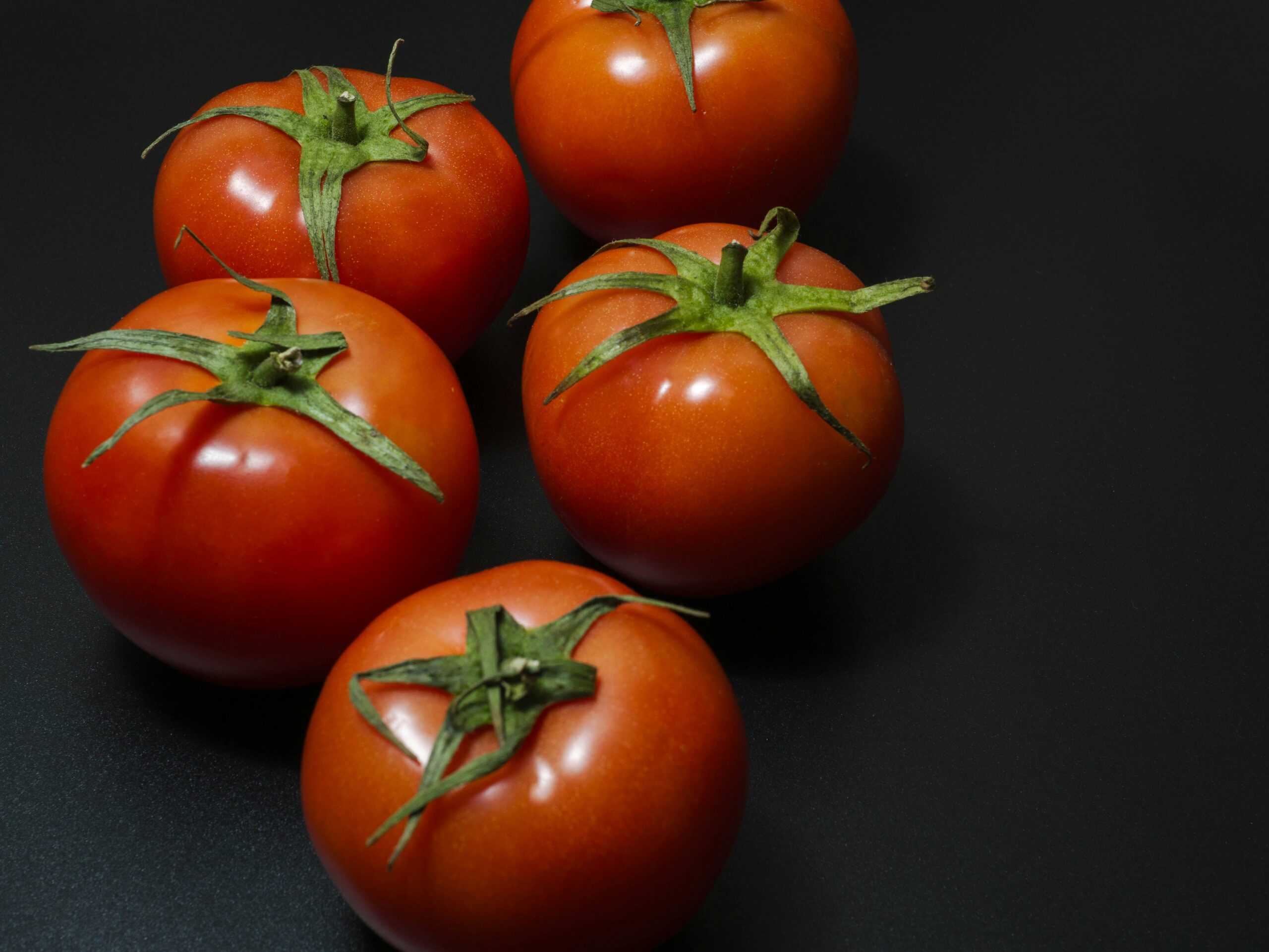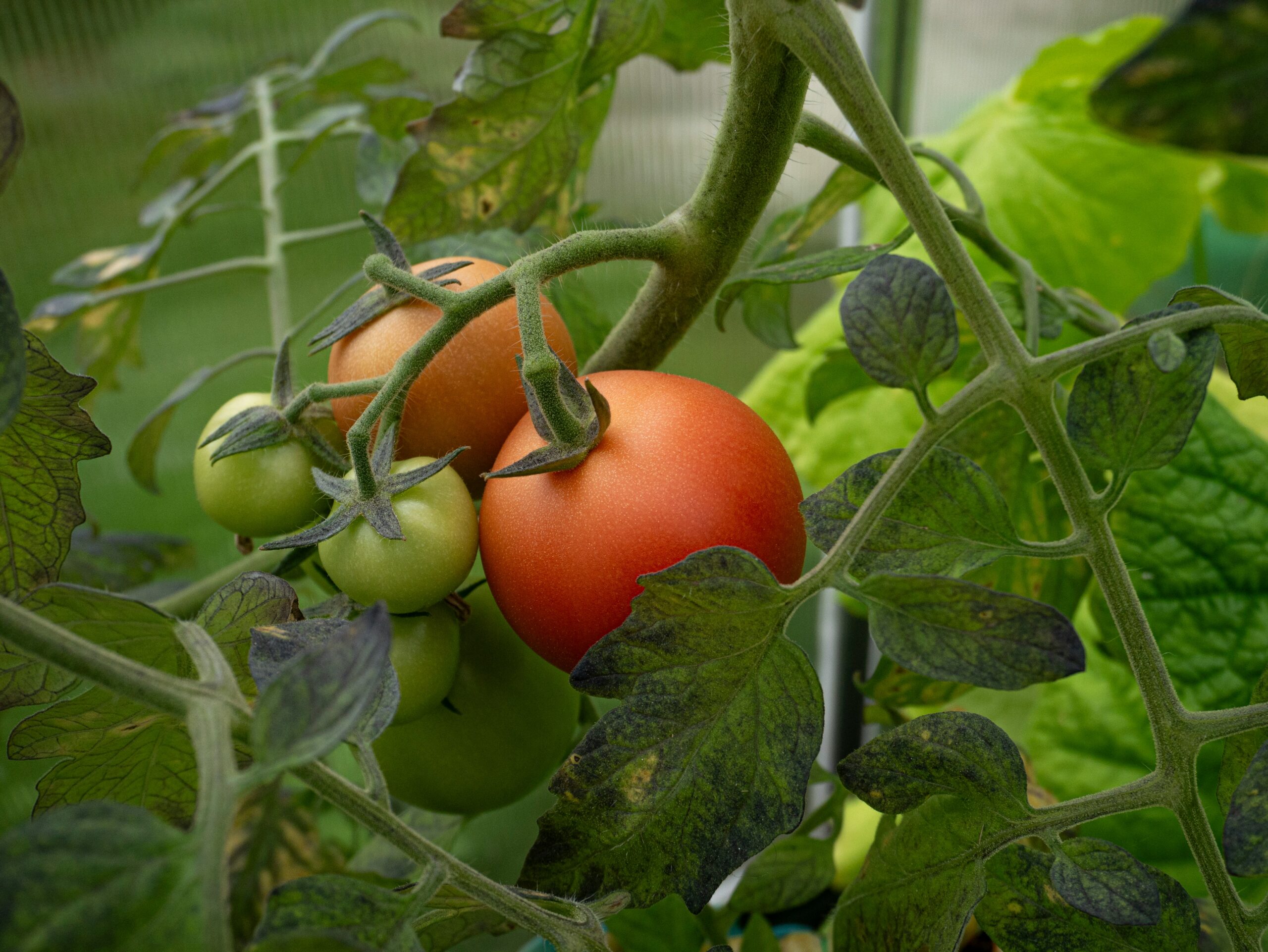Tomatoes are widely consumed worldwide, with the Mediterranean diet trendy. The vegetables vary in size, shape, and color. In addition to the traditional red ones, there are also yellow, orange, and green. Vegetables grow on shrubs, which are often grown in greenhouses. Tomatoes can be eaten raw but are usually processed and added to various dishes
Tomatoes are tasty and full of vitamins and minerals, offering a wide range of beneficial effects on the body. They have a high nutritional value, excellent health properties, and dietary benefits.
However, despite the many health benefits, eating tomatoes has some contraindications. It has also been noted that, in a few cases, these vegetables can cause side effects. But if there are no contraindications or side effects, it is worth adding tomatoes to your diet. Tomatoes are tasty, juicy, and versatile, so they can be used in many ways in the kitchen. Learn the secrets of tomatoes.

Tomatoes are vital to nutrition due to their guaranteed health benefits. They belong to the Solanaceae plant family![]() and are grown worldwide, often in home gardens. Different varieties of tomatoes exist, so the amount of nutrients in them can vary. However, many studies on tomatoes have concluded that their presence in the diet will provide many health benefits.
and are grown worldwide, often in home gardens. Different varieties of tomatoes exist, so the amount of nutrients in them can vary. However, many studies on tomatoes have concluded that their presence in the diet will provide many health benefits.
Thanks to their vitamin and mineral content, tomatoes can effectively lower cholesterol![]() , which is essential for heart health. Tomato in the diet also contributes to lowering blood pressure, thus preventing dangerous cardiovascular diseases such as heart attack and stroke. Tomato's bioactive compounds can also alleviate the symptoms of various cardiovascular diseases. The vegetable has anticoagulant and anti-atherosclerotic effects. Tomatoes in the diet reduce atherosclerotic lesions, especially when combined with polyunsaturated fatty acids. Thus, it can be summarized that tomato triggers antioxidant mechanisms that can confer a cardioprotective effect.
, which is essential for heart health. Tomato in the diet also contributes to lowering blood pressure, thus preventing dangerous cardiovascular diseases such as heart attack and stroke. Tomato's bioactive compounds can also alleviate the symptoms of various cardiovascular diseases. The vegetable has anticoagulant and anti-atherosclerotic effects. Tomatoes in the diet reduce atherosclerotic lesions, especially when combined with polyunsaturated fatty acids. Thus, it can be summarized that tomato triggers antioxidant mechanisms that can confer a cardioprotective effect.

Tomatoes contain many vitamins that can strengthen the body's immunity. Tomatoes are also vegetables rich in antioxidants that help the body fight cold and flu germs. In studies, experts indicate that tomato has anti-inflammatory and antimicrobial effects. Therefore, the presence of tomatoes in the diet can affect protection against various infections.
Tomatoes contain minerals and vitamins that are important for bone health. Vegetable ingredients are essential for strong bones. Tomatoes have a calcium, which is part of the bone matrix. As a result, tomatoes keep the bone structure in proper condition, protecting against osteoporosis![]() . Therefore, eating tomatoes can strengthen bones and improve overall health.
. Therefore, eating tomatoes can strengthen bones and improve overall health.
Tomatoes contain active ingredients used in some facial and hair care products. They can promote collagen production, moisturize the skin, and counteract epidermis keratosis. Thanks to their antioxidant and vitamin content, tomatoes can also help improve the elasticity of hair and nails. Tomato extract is a powerful antioxidant and immune stimulant, so cosmetic companies often use the valuable ingredients of tomatoes in their products.
Tomatoes contain vitamins that are good for the organs of sight. They can improve vision and prevent eye diseases such as night blindness![]() . Tomatoes also inhibit the distortion of the macula in the eye, which determines correct vision in seniors. Due to their antioxidant and anti-inflammatory properties, tomatoes are essential to eye health.
. Tomatoes also inhibit the distortion of the macula in the eye, which determines correct vision in seniors. Due to their antioxidant and anti-inflammatory properties, tomatoes are essential to eye health.

People with kidney disease cannot eat certain vegetables because of their oxalates. However, tomatoes contain small amounts of these harmful components, so people with kidney problems can eat them. In addition, some studies show that tomatoes in the diet can reduce the risk of kidney stones. But if you have kidney disease, consult your doctor first and ask whether tomatoes in your diet will harm you.
Tomatoes contain natural antioxidants that fight free radicals thanks to conjugated double bonds and hydroxyl groups. The vegetable also contains various vitamins that have antioxidant effects, protecting against cell damage. To best benefit from tomatoes' antioxidant properties, it is recommended to eat them raw, as heat treatment can reduce the amount of compounds and vitamins present in them.
Many studies suggest that eating tomatoes, which contain various specific chemical compounds, helps reduce the risk of cancer. This includes diseases such as stomach cancer![]() , colon cancer
, colon cancer![]() , and prostate cancer
, and prostate cancer![]() . The antioxidants in vegetables slow the growth of harmful cancer cells. Various mechanisms are responsible for protecting the body from cancer. One of them is the prevention of oxidative stress. In addition, other studies suggest that tomatoes in the diet may mitigate the effects of cancer. People who showed a higher intake of tomatoes had a better prognosis. So, it's worth adding tomatoes to your diet if there are no contraindications.
. The antioxidants in vegetables slow the growth of harmful cancer cells. Various mechanisms are responsible for protecting the body from cancer. One of them is the prevention of oxidative stress. In addition, other studies suggest that tomatoes in the diet may mitigate the effects of cancer. People who showed a higher intake of tomatoes had a better prognosis. So, it's worth adding tomatoes to your diet if there are no contraindications.

Tomatoes contain minerals and bioactive compounds that help maintain blood sugar levels. The compounds show hypoglycemic effects and also protect against diabetic nephropathy. The antioxidants in the vegetables can reduce symptoms of diabetes, such as joint pain and numbness. In addition, the antiplatelet effect of tomatoes helps delay the formation of blood clots, which is also essential for patients with diabetes. Also, women with gestational diabetes consuming tomatoes can reduce oxidative stress in newborns during delivery.
Thanks to tomatoes in the diet, the skin is more resistant to UV radiation. Thus, tomatoes can protect against skin cancer from too much UV radiation. However, it would help if you remembered to protect yourself with sunscreen. Consuming tomatoes will enhance the effect of chemical and mineral anti-UV filters in the cosmetics you apply to your face and body.
There are many different varieties of tomatoes, but their nutritional content is similar. Tomatoes are very watery vegetables that can also effectively hydrate the body. Regarding macronutrients, tomatoes consist mainly of carbohydrates and protein and have an insignificant amount of fats. The vegetables also contain a lot of fiber, which is another advantage. In addition, these vegetables are low in calories, as there are only 18 kcal![]() in 100 grams of tomatoes.
in 100 grams of tomatoes.
Despite the low caloric value, people on a weight-loss diet only reach for tomatoes sometimes due to the high amount of sugars. However, fresh tomatoes are low in sugar and have a low glycemic index, so they usually do not significantly affect blood sugar levels. The naturally occurring sugars in tomatoes add a distinctive sweet flavor worth taking advantage of. The micronutrients in tomatoes are essential and are responsible for many health properties. These include:

Tomatoes have a lot of vitamins that should be included in the diet. The vegetable provides vitamin A, which is responsible for, among other things, proper skin formation, vision function, and reproductive functions. In addition, you will find B vitamins in tomatoes, which are characterized by various functions such as metabolism and brain function support. Tomatoes are also a source with a significant vitamin C content, which has many benefits, including influencing the immune system's work. In addition, there are also vitamins E and K in tomatoes. Vitamin K is more abundant and necessary for adequately developing bones and teeth.
Minerals are other valuable components that a tomato can provide. The vegetable has large amounts of potassium, which, among other things, maintains the body's acid-base balance. We can also find phosphorus, which has many valuable functions, and magnesium. Patients often have magnesium deficiencies, which are essential for brain function, among other things, so it is worthwhile to ensure the supply of this mineral in the diet. Tomatoes have many minerals in their composition, including iron. However, these are small amounts of iron, so tomatoes should not be the primary source. Tomatoes also have smaller amounts of zinc, calcium, and manganese.
Lycopene is an essential active ingredient that gives tomatoes valuable health properties. It is an antioxidant responsible for the color of vegetables. The chemical compound can neutralize the harmful effects of free radicals, an excess of which can contribute to the development of many different diseases. Consuming foods rich in lycopene and other antioxidants reduces the risk of oxidative stress. It exhibits anti-inflammatory and immunomodulatory effects. It is, therefore, worth providing lycopene in the diet, and tomatoes contain large amounts of this valuable ingredient.

Beta-carotene is another essential antioxidant found in tomatoes. It is also a natural plant pigment. The compound can convert into vitamin A, increasing its absorption. Beta-carotene also helps protect cells from free radical damage. Thanks to its natural antioxidant content, tomatoes effectively protect against various diseases. In addition to this, beta-carotene has many other functions, including affecting the condition of the skin and hair.
Phenolic acids are compounds of natural origin that exhibit antioxidant activity. In addition, phenolic acids show several other health-promoting properties. The compounds exhibit anti-diabetic effects and are also suitable for the cardiovascular system. Regular consumption of phenolic compounds lowers blood glucose levels and blood pressure. Therefore, phenolic acids are other valuable components that tomatoes can provide us with.
Tomatoes also contain lutein. Lutein gives the vegetable color and is responsible for several physiological processes. Unlike beta-carotene, it does not convert to vitamin A but exhibits strong antioxidant properties. This active compound is also important for healthy eyes. Lutein is fat-soluble, so its absorption from the digestive system increases in the presence of fatty products. Hence, it is advisable to combine vegetables with oil.
Tomato also contains compounds such as flavonoids. These natural compounds produced by plants protect the body's cells from damage. A wide variety of effects characterizes flavonoids. Flavonoids have applications in preventing and treating many diseases due to their valuable properties. Their presence in tomatoes is even necessary, as they intensify the antioxidant properties of the other components of the tomato. One of the essential substances classified as flavonols that is found in tomatoes is quercetin![]() .
.

Tomatoes have many health benefits, but moderation is recommended. This is primarily related to the moderate amount of oxalic acid in tomatoes, which can negatively affect kidney function. Therefore, people suffering from kidney disease should not consume too much vegetables with oxalic acid![]() . Contraindications for eating tomatoes also apply to their high acidity. A diet with a high content of tomatoes is also not recommended for people with diseases of the stomach and duodenum. An absolute contraindication is an allergy to tomatoes, which can lead to anaphylactic reactions
. Contraindications for eating tomatoes also apply to their high acidity. A diet with a high content of tomatoes is also not recommended for people with diseases of the stomach and duodenum. An absolute contraindication is an allergy to tomatoes, which can lead to anaphylactic reactions![]() . It is also noted that the consumption of tomatoes can be associated with the following dangers:
. It is also noted that the consumption of tomatoes can be associated with the following dangers:
Heartburn can be a side effect of eating tomatoes. These vegetables can cause increased hydrochloric acid secretion, which promotes backflow of gastric contents into the esophagus. This is most likely related to their low pH. Studies show that eating tomatoes can contribute to worsening reflux symptoms and the onset of heartburn. Therefore, people with reflux and heartburn symptoms should avoid eating tomatoes.
People with irritable bowel syndrome must adhere to a well-rounded diet that will not exacerbate symptoms. Tomatoes are not recommended for such patients, as they are high in fructose. It means that they can trigger histamine reactions in some people. However, tomatoes are also rich in dietary fiber, which is essential for the digestive system. Therefore, some specialists permit people with irritable bowel syndrome to eat tomatoes, but the vegetable should be stripped of its skin and seeds.

Tomatoes are among the acidic foods that can irritate the urinary bladder. People susceptible to such stimuli may experience discomfort from fresh tomatoes and processed foods made from these vegetables. Consequently, people prone to urinary tract problems should avoid eating tomatoes.
Tomatoes are foods that can trigger migraine attacks. Migraine prevention should be based on limiting or completely giving up foods that can trigger migraine attacks.
Tomatoes contain large amounts of natural pigments, so too much in the diet can lead to lycopenoderma![]() . The effect of an overdose of tomatoes mainly manifests as lycopenodemia, a characteristic orange skin coloration. The condition is often manifested by a change in skin color to an orange tint on the inside of the hands.
. The effect of an overdose of tomatoes mainly manifests as lycopenodemia, a characteristic orange skin coloration. The condition is often manifested by a change in skin color to an orange tint on the inside of the hands.
Some sources report a possible risk of Salmonella infection from eating tomatoes. Infections were detected in 2004![]() in the United States and Canada and have been linked to eating tomatoes in restaurants.
in the United States and Canada and have been linked to eating tomatoes in restaurants.
Eating store-bought tomatoes can also carry risks associated with pesticides. Toxic substances used in tomato production should not exceed designated limits, but contaminant exposure is possible. Therefore, washing the vegetables thoroughly or steaming and peeling the tomatoes before eating is advisable.